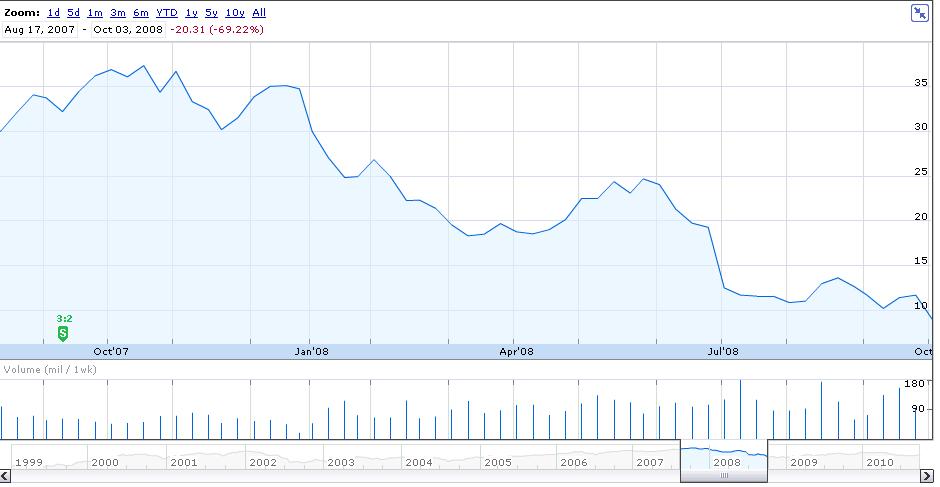Early this morning I experimented with Dave Pinsen's latest financial product, the Portfolio Armor app. The tool is designed to rapidly search for optimal insurance on purchases to minimize the transaction's downside. Such a practical and focused tool forced me to recognize the drastic changes to personal investment over the past decade. There are multiple social networks for traders like the StockTwits and Shortscreen communities. Back when I actively traded stocks, I was a lone fish.
If I had access to Portfolio Armor and some of the sharp minds at StockTwits a few years ago, I might still be active and thriving in the market today. Based on my aggressive investment strategy, it's more likely I wouldn't have hedged bets and exchanged upside to limit losses.
Today I'm a public market investor primarily through my 401k. This liberates me from the concern of daily fluctuating stock prices. The root of this position on stocks was planted just a few years ago, and my hope is that you may learn something from my mistakes.
The High Times
I had built up $10k worth of shares with a fraction of that amount through careful (lucky) trades on ETrade and later Ameritrade over a number of years. What better way to learn how the public values stocks than with my own money. Boxers don't become champions merely by watching other guys get punched in the face, they step into the ring.
I traded across several different areas based on my amateur perception of value. I held Microsoft during the big dividend, and sold it after it outpaced the related drop. I owned Brazilian oil during it's rise, and dumped Caldera before it sunk. I could do no wrong. I was a deluded investor, but reality always strikes back.
Who needs graphics?
I heavily invested in NVidia a few years back. My rationale was based on a strong faith in the product. I drank deeply of eye candy kool aid. As a long time video gamer I recognized NVidia as the best in the market since 1998. My estimate of Nvidia's future was based purely on the rapid growth of visually stunning social games. My early favorites were hot seat turn based strategy, then later massive multiplayer games. Even with stiff competition from other graphic card manufacturers, I assumed the rising tide would raise all ships.
I noticed NVidia dip in early 2008, and I double downed on my ownership with a margin purchase of more shares. As I checked bi-weekly (I was never very active) it kept on sinking. I was blown away by the plummeting stock prices, and wanted to buy more shares. Ultra popular games were looking better than ever on NVidia cards, I couldnt' understand what the hell was happening. The end result is that I lost 95% of my personal trading funds when all my shares were liquidated to cover the margin.
This pitfall was minor compared to losing 35% of my larger 401k. It lost all that value in a week or two in September 2008 while I was visiting Montana and mostly offline. My 401k has yet to recover although it's a more conservative mix. That could be part of my investment problem, I no longer trust public evaluation. To a laymen like myself, the market is an irrational beast.
Beyond NVidia Stock, the Gaming Trend was a Shock
I was even more surprised by the rapid growth of trivial social games. The majority of people weren't ready to pay subscriptions for gorgeously rendered virtual worlds. The market demanded free*, low-fi, light social games and a few companies were ready to pounce on that cultivated market. The absurdity of this market trend is like "Social Pong" making a come back. Businesses like Zynga skyrocketed in revenue by leveraging Facebook's growth and offering minimal viable products. The games are crafted not to maximize entertainment, but instead are psychologically engineered to induce repeat visits and reward player advertisement.
I question how long the low-fi gaming market will hold the market's attention. Maybe it's a perfect time to buy back in to NVidia. This time I can check what StockTwit users are saying or hedge my bets with Portfolio Armor. Even if I choose not to leverage these tools, at least now I have the option.
Notes:
*= Not really free. If you play for free someone pays for your entertainment by buying virtual goods in the Freemium model. A sharp business model when implemented well, with high conversion rates. For social Freemium games customers pay for the game system, and for your time to play with them.
Why is NVidia death spiraling:
